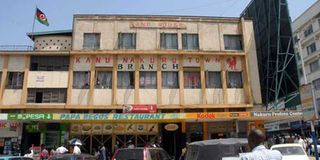Kanu to lose office over Sh738 million electricity bill

Kanu House in Nakuru, which Kenya Power is seeking to sell to recover a Sh738 million debt. PHOTO | FILE | NATION MEDIA GROUP
What you need to know:
Kenya Power first obtained an attachment order in August 2009, after Justice Jessie Lesiit ruled in its favour.
But the party's Nakuru branch objected to the planned attachment.
The debt keeps increasing because of an annual 12 per cent interest.
Kenya Power has been allowed to auction the Kenya African National Union's (Kanu) offices in Nakuru to recover Sh738.8 million the party incurred in electricity bills when it occupied the Kenyatta International Convention Centre (KICC) during retired President Daniel arap Moi’s tenure.
Court of Appeal Judges Philip Waki, Patrick Kiage and Fatuma Sichale declined to issue a temporary order barring Kenya Power from recovering the amount Kanu accrued during the eight years it had its headquarters at the KICC.
AUCTION
Kenya Power first obtained an attachment order in August 2009, after Justice Jessie Lesiit ruled in its favour. But the party's Nakuru branch objected to the planned attachment.
In July 2014, the High Court deputy registrar rejected Kanu’s argument that the assets owned by a political party’s branch cannot be sold to settle the mother entity’s debts.
Dissatisfied, the Kanu Nakuru branch challenged the decision, but High Court Judge Francis Tuiyott ruled that a political party’s branch is not distinct from the mother party, and allowed Kenya Power to continue with its planned auction.
EVICTION
Kanu Nakuru branch then moved to the Court of Appeal, which has also refused to stop the attachment of the party's property.
Kanu took possession of KICC in 1995 but was kicked out in 2003 shortly after Mr Mwai Kibaki became President.
The party’s attempts to reclaim the iconic building fell through after the Constitutional Court in 2008 dismissed a suit it filed challenging its eviction.
INTEREST
The electricity bill grew because Kanu would make payments of between Sh200,000 and Sh300,000, in instalments, against its Sh3 million monthly consumption.
At the time of the ruling, Kanu’s debt had grown from Sh212 million to Sh738 million because of a 12 per cent annual interest, which will continue until the suit is determined.
Although Justices Waki, Kiage and Sichale found that the Kanu Nakuru branch’s suit is not frivolous, they ruled that no evidence had been given to support the claim that its property is unique and irreplaceable, or that Kenya Power will be unable to refund it, should the appeal succeed.
DOUBTS
The judges expressed doubts about Kanu’s chances of success.
Kanu Nakuru branch insisted, through lawyer Lawrence Mwangi, that the High Court misconstrued the Political Parties Act of 2011, which transformed all political parties from societies into corporate bodies.
Mr Mwangi added that the appeal would be rendered useless if an order stopping auction of the building was not granted.
But Kenya Power lawyer Kenneth Fraser said the party branch filed the appeal out of time, and that his client had already instructed auctioneers to attach the disputed office.
He added that Kenya Power’s debt continues to accrue, and that the firm had spent millions in its efforts to get Kanu to pay.





